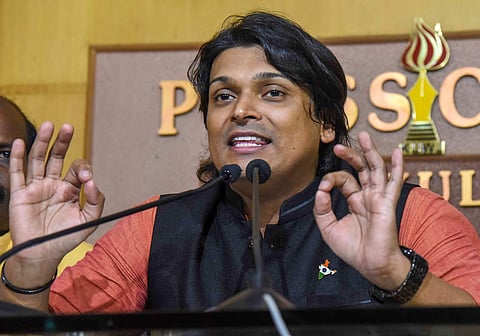

NEW DELHI: Social activist Rahul Easwar on Thursday welcomed the Supreme Court's verdict of referring a batch of review petitions against its September 2018 verdict allowing entry of women of all age groups into the Sabarimala temple to a larger constitutional bench.
However, he said that there is no clarity regarding the stay by the Supreme Court on its earlier order.
"The court should look all of this. We are yet to know whether there is stay on it. Please don't interfere in any faith beyond a point. India is land of great pluralism and faith freedom. I think that is a positive step in the right direction. We should welcome this," Easwar said.
ALSO READ: Supreme Court refers Sabarimala case to seven-judge bench
"We obey the Supreme Court. But Article 25 also gives us some rights. Faith is not above religion. We should celebrate this verdict. Temple or churches are not like roads they are sacred places and private spaces of believers for public worship," he said.
He further said: "Even if there is no stay it implicitly means the verdict is wrong and it should be reviewed. This thing should not be forced upon."
Eshwar said that the Sabarimala Verdict review is a great victory for Article 25, 26 and for faith of devotees.
ALSO READ | T N Seshan: Rights, gender and Sabarimala
"From 2006 - 2019, Swamy Ayyappa believers have fought legally and socially for this verdict... This approach by the Supreme Court is a relief for people of all faiths and essentially point out to the fact that temples, mosque, churches are private spaces of believers for public worship," he said.
The Supreme Court on Thursday referred to a larger constitution bench a batch of review petitions against its September 2018 verdict allowing entry of women of all age groups into the Sabarimala temple.
While Justice Rohinton Fali Nariman and Justice DY Chandrachud dissented, Chief Justice Ranjan Gogoi, Justice AM Khanwilkar, Justice Indu Malhotra sent the Sabarimala review to a larger Bench by a 3-2 ruling.
VIEW GALLERY: SC refers Sabarimala verdict to seven-judge bench, here is what you need to know!
"The entry of women into places of worship is not limited to this temple only. It is also involved in the entry of women into mosques," Chief Justice Gogoi said while reading out the verdict.
A Constitution Bench led by Chief Justice of India (CJI) Ranjan Gogoi passed the order on a series of petitions seeking reconsideration of its September 2018 judgment that lifted the bar on menstruating women from worshipping in the Sabarimala temple in Kerala.
The apex court in a landmark 4:1 ruling had set aside decades-old restrictions on the entry of women of age between 10 to 15 years inside the temple.
One of the five Judges, Justice Indu Malhotra had, however, dissented and ruled that judges should not impose their personnel views.